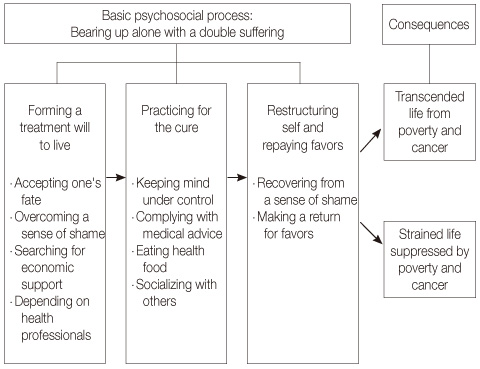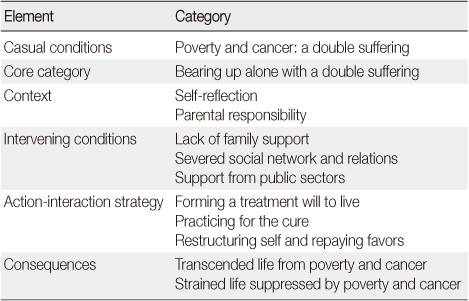Articles
- Page Path
- HOME > J Korean Acad Nurs > Volume 41(2); 2011 > Article
-
Original Article
- Psychosocial Adjustment of Low-Income Koreans with Cancer
- Myungsun Yi, Eun Young Park, Dal Sook Kim, Young Sook Tae, Bok Yae Chung, Hyang Sook So
-
Journal of Korean Academy of Nursing 2011;41(2):225-235.
DOI: https://doi.org/10.4040/jkan.2011.41.2.225
Published online: April 30, 2011
1Professor, College of Nursing, Seoul National University, Seoul, Korea.
2Assistant Professor, Nursing Science Department, Gachon University, Incheon, Korea.
3Professor, School of Nursing, Chungnam National University, Daejeon, Korea.
4Professor, College of Nursing, Kosin University, Busan, Korea.
5Professor, College of Nursing, Kyungpook National University, Daegu, Korea.
6Professor, College of Nursing, Chonnam National University, Gwangju, Korea.
- Address reprint requests to: Park, Eun Young. Nursing Science Department, Gachon University, 534-2 Yeonsu 3-dong, Yeonsu-gu, Incheon 406-799, Korea. Tel: +82-32-820-4207, Fax: +82-32-820-4201, parkeunyoung@gachon.ac,kr
• Received: August 21, 2010 • Accepted: April 15, 2011
© 2011 Korean Society of Nursing Science
Abstract
-
Purpose
- To describe psychosocial adjustment of low-income Koreans who have cancer.
-
Methods
- Data were collected during 2008 using individual in-depth interviews with 18 Korean people with cancer. The income status of the participants was low, 11 were recipients of the National Basic Livelihood Protection program. Mean age was 58.3 yr and 11 were female. Five participants had stomach cancer, five, colorectal cancer, and four, breast cancer. Data were analyzed using grounded theory methodology.
-
Results
- The core category emerged as 'bearing up alone with double suffering'. 'Poverty and cancer: A double suffering' emerged as a causal condition. The adjustment process consisted of three stages: 'forming a treatment will to live' ,'practicing for the cure',and 'restructuring self and repaying favors'. Each stage indicated action-interaction strategies which were employed to bear up alone with double suffering during the illness process. Self-reflection, parental responsibility, and support from the public sector played important roles in overcoming the double suffering. Two types of consequences were identified: Transcended life and strained life suppressed by poverty and cancer.
-
Conclusion
- The results provide insights into the psychosocial adjustment process for low income Korean with cancer and can be used in developing and implementing efficient home-care services for these people.
- 1. Aarts MJ, Lemmens VE, Louwman MW, Kunst AE, Coebergh JW. Socioeconomic status and changing inequalities in colorectal cancer? A review of the associations with risk, treatment and outcome. European Journal of Cancer. 2010;46:2681–2695.ArticlePubMed
- 2. Barton-Burke M, Smith E, Frain J, Loggins C. Advanced cancer in underserved populations. Seminars in Oncology Nursing. 2010;26:157–167.ArticlePubMed
- 3. Blumer H. Symbolic interactionism. 1969;Englewood Cliffs, NJ, Pre-ntice-Hall.
- 4. Cho H, Son J, Hur J, Jin E. A study on demand and the supply for home-based cancer patient management projects of public health centers. Korean Journal of Hospice Care. 2007;10:195–201.
- 5. Hughes A, Gudmundsdottir M, Davies B. Everyday struggling to survive: Experiences of the urban poor living with advanced cancer. Oncology Nursing Forum. 2007;34:1113–1118.ArticlePubMed
- 6. Hur HK, Kim DR, Kim DH. The relationships of treatment side effects, family support, and quality of life in patient with cancer. Journal of Korean Academy of Nursing. 2003;33:71–78.ArticlePubMedPDF
- 7. Hwang SY. An exploratory analysis of the existential experiences of women with cancer. Journal of Korean Neuropsychiatric Association. 2006;45:554–564.
- 8. Kim H, Kwon J, Lim J, Lee R, Lee K. Posttraumatic growth and related factors in breast cancer survivors. Korean Journal of Health Psychology. 2008;13:781–799.Article
- 9. Lee E. A Qualitative research on the working poor's lived experiences: Grounded theory analysis. Social Welfare Policy. 2008;34:331–356.
- 10. Lee HY. Qualitative research on public assistance recipients experiencing social exclusion. Korean Social Security Studies. 2009;25(1):281–315.
- 11. Lee SH, Kim J, Lee H, Kang NM, Kim H, Lee E, et al. A grounded-theory approach to the process of life adaptation in women with cervical cancer. Korean Journal of Women Health Nursing. 2004;10:32–41.ArticlePDF
- 12. Lee TW, Ko I, Lee K, Kang K. Health status, health perception, and health promotion behaviors of low-income community dwelling elderly. Journal of Korean Academy of Nursing. 2005;35:252–261.ArticlePubMedPDF
- 13. Lee YD. Mind: KBS special project document. 2006;Seoul, Yedam.
- 14. Special support for cancer patients: Self medical payment 5%: The Hot News. Ministry of Health and Welfare. 2010;August;Retrieved September 1, 2010. from http://mw.korea.kr/gonews/branch.
- 15. Moadel AB, Morgan C, Dutcher J. Psychosocial needs assessment among an underserved, ethically diverse cancer patient population. Cancer. 2007;109:446–454.ArticlePubMed
- 16. National Cancer Center. Cancer facts & figures 2009. 2009;07;Seoul, Ministry for Health, Welfare and Family Affairs.
- 17. Cancer mortality 2008. National Cancer Information Center. 2010a;Retrieved August 10, 2010. from http://www.cancer.go.kr/cms/statics/mortality/index.html.
- 18. Cancer prevalence 2007. National Cancer Information Center. 2010b;Retrieved August 10, 2010. from http://www.cancer.go.kr/cms/statics/can_in_lif/index.html.
- 19. Park EY, Yi M. Illness experience of women with breast cancer in Korea: Using feminist phenomenology. Journal of Korean Academy of Adult Nursing. 2009;21:504–518.
- 20. Park JS, Oh YJ. An analysis of cancer symptoms, perceived health status, and given nursing services for community dwelling cancer patients who are registered in a public health center. Journal of Korean Oncology Nursing. 2010;10:48–58.
- 21. Park M, Kim K. Cancer survivors' life experience. Journal of Korean Oncology Nursing. 2008;8:93–104.
- 22. Sandelowski M. The problem of rigor in qualitative research. Advances in Nursing Science. 1986;8(3):27–37.ArticlePubMed
- 23. Sobrino J. Spirituality of liberation: Toward political holiness. 1988;Maryknoll, NY, Orbis Books.
- 24. Soothill K, Morris SM, Thomas C, Harman JC, Francis B, McIllmurray MB. The universal, situational, and personal needs of cancer patients and their main carers. European Journal of Oncology Nursing. 2003;7:5–13.ArticlePubMed
- 25. Strauss A, Corbin J. Basic of qualitative research: Techniques and procedures for developing grounded theory. 1998;2nd ed. Thousand CA, Sage Publications.
- 26. Tae YS. Hope phenomenon of Korean cancer patients. 1994;Seoul, Ewha Womans University. Unpublished doctoral dissertation.
- 27. Tae YS, Kang ES, Lee MH, Park GJ. The relationship among perceived social support, hope and quality of life of cancer patients. Korean Journal of Rehabilitation Nursing. 2001;4:219–231.
- 28. Williams BR. Dying young, dying poor: A sociological examination of existential suffering among low-socioeconomic status patients. Journal of Palliative Medicine. 2004;7:27–37.ArticlePubMed
- 29. Yang J. The actual experiences of the living world among cancer patients. Journal of Korean Academy of Nursing. 2008;38:140–151.ArticlePubMed
- 30. Yun EH, Lim MK, Oh J, Shin A, Sung J, Park E. Combined effect of socioeconomic status, viral hepatitis, and lifestyles on hepatocelluar carcinoma risk in Korea. British Journal of Cancer. 2010;103:741–746.ArticlePubMedPMCPDF
REFERENCES
Figure & Data
REFERENCES
Citations
Citations to this article as recorded by 

- A Systematic Review of the Influence of Social Determinants of Health on Mental Health Service Utilization and Outcomes Among Asian American Cancer Survivors
Yi-Ping Wen, Eden R. Brauer, Kristen Choi
Journal of Racial and Ethnic Health Disparities.2025;[Epub] CrossRef - Relationships between Canadian adult cancer survivors’ annual household income and emotional/practical concerns, help‐seeking and unmet needs
Irene Nicoll, Gina Lockwood, Christopher J. Longo, Carmen G. Loiselle, Margaret I. Fitch
Health & Social Care in the Community.2022;[Epub] CrossRef - Illness Experiences of Adolescents with Type 1 Diabetes
Ji Eun Kim, Ilaria Campesi
Journal of Diabetes Research.2022; 2022: 1. CrossRef - A Decision Tree Model for Breast Reconstruction of Women with Breast Cancer: A Mixed Method Approach
Eun Young Park, Myungsun Yi, Hye Sook Kim, Haejin Kim
International Journal of Environmental Research and Public Health.2021; 18(7): 3579. CrossRef - The Illness Adaptation Process of Patients Suffering from Myelodysplastic Syndrome (MDS): Doing My Best in Uncertainty
Ae-Kyung Kim
Korean Journal of Adult Nursing.2017; 29(5): 472. CrossRef - Cancer Survivorship Care among Oncology Nurses in Korea
Hye Sook Kim, Hye-Young Jang, Myungsun Yi, Hye Yeon Seo
Asian Oncology Nursing.2017; 17(2): 124. CrossRef - Qualitative study on experience of health behavior among Korean low-income breast cancer survivors
Young-Sun Rhee
Journal of the Korea Academia-Industrial cooperation Society.2015; 16(5): 3188. CrossRef - The Effectiveness of a Forest-experience-integration Intervention for Community Dwelling Cancer Patients' Depression and Resilience
Yeon Hee Choi, Young Sun Ha
Journal of Korean Academy of Community Health Nursing.2014; 25(2): 109. CrossRef - Psychosocial needs of low-income people with cancer in Korea
Myungsun Yi, Keeho Park, Eun Young Park
European Journal of Oncology Nursing.2014; 18(6): 549. CrossRef - An Analysis of Cancer Survival Narratives Using Computerized Text Analysis Program
Dal Sook Kim, Ah Hyun Park, Nam Jun Kang
Journal of Korean Academy of Nursing.2014; 44(3): 328. CrossRef - The Identification of the Characteristics of Cancer Patients Who Defected to Other Medical Institutions
Jae-Bin Cha, Jung-He Nam, Sung-Sik Ahn
The Korean Journal of Health Service Management.2013; 7(1): 1. CrossRef
Psychosocial Adjustment of Low-Income Koreans with Cancer

Figure 1
Process of psychosocial adjustment in low-income Koreans with cancer.
Figure 1
Psychosocial Adjustment of Low-Income Koreans with Cancer
Relationships among Categories using Paradigm Model
Table 1
Relationships among Categories using Paradigm Model
 KSNS
KSNS
 E-SUBMISSION
E-SUBMISSION


 Cite
Cite

